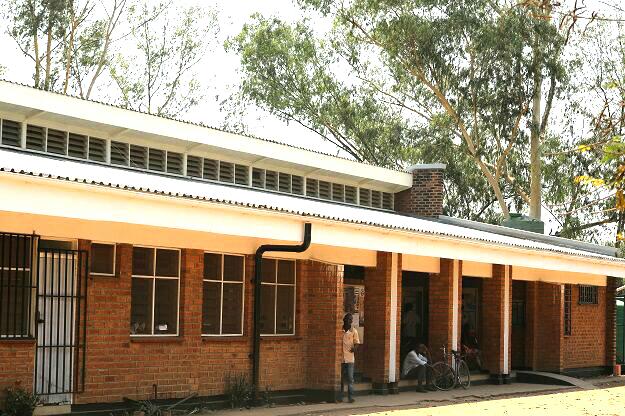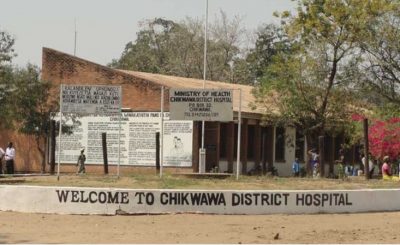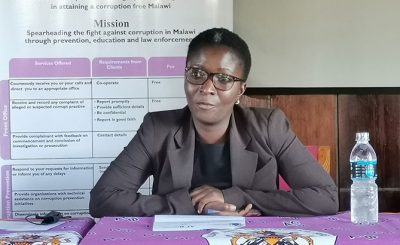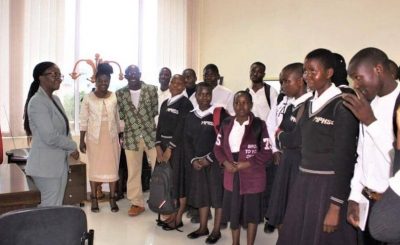For every pregnant woman there is nothing that can be compared to the pain of losing a baby following untimely access to child-birth care due to unavailability of an ambulance.
For Joyce Justin, 29, her situation is not different either and worse still, she has to live in a traumatic situation of leaking urine continuously and being pushed into abject poverty.
Justin, agonizingly reckons how a wonderful moment to finally welcome her beautiful fourth child ended up in a stressful condition.
“On June 19, 2017 I felt labour pains and my relatives accompanied me to Ngokwe Health Centre where I arrived at around 8am,” narrates Jackson, a resident of Malajira village, Traditional Authority Ngokwe in Machinga district.
It was after arriving at the facility that Justin noticed that things were not going as she expected.
“I was not attended to and I spent the night there,” says Justin, a mother of three.
Justin was then referred to Machinga District Hospital a day after but to her surprise she spent the next two days at the facility as there was no any ambulance to ferry her to the hospital.
“On June 20 at around 8am the ambulance came and took one pregnant girl and left but I was left behind. The Nurse asked for the ambulance only to be told that it could not return,” Justin recounts.
After seeing that she was bleeding and her condition was worsening, on June 21, 2017, Justin was told to arrange her own transportation to Machinga District Hospital.
The news was very disturbing to her as she had to look for money to hire a vehicle to travel a distance of 102 kilometers to the hospital which is situated in Liwonde.
The thought of covering the massive distance of which 48 kilometers is on a bumpy earth road from Ngokwe to Ntaja Trading Centre was also stressful to her.
However, Justin ended up coughing K43, 000 for the whole journey.
“We were charged K28, 000 to reach Ntaja Health Centre with the expectation that the ambulance would pick me from there. The ambulance did not come and we paid another K15, 000 to reach Liwonde,” Justin complains.
After arriving at the hospital and going into labour, it is when tragedy struck Justin’s family.
“I received treatment but when I went into labour my baby died because she lacked oxygen due to the delay to access healthcare,” she says.
Apart from losing her baby, Justin is now left with an Obstetric fistula.
Obstetric fistula is the most devastating and serious of all childbirth injuries that is caused by prolonged obstructed labor, leaving a woman incontinent of urine or feces or both.
Justin says: “After being discharged I noticed that I started releasing urine uncontrollably. I am now waiting to be referred again to Machinga District Hospital to receive treatment.”
She now feels isolated due to the problem as she cannot actively participate in development activities in her area.
“When I stand up urine comes out and I face difficulties to walk around. I am now failing to mix with my fellow women. My love life as a married woman has also been affected because of the smell,” she adds.
Justin’s life has also changed for the worse as her family is in abject poverty due to the sale of all the family’s property to pay for her transportation to the district hospital.
“It pains so much that I lost my baby and property because I believe if the ambulance was available this could not have happened. My family has nothing now and my three children are suffering,” Justin explains.
Thokozani Ngomba, the only qualified nurse, midwife and technician at Ngokwe Health Centre concurs with Justin on the challenges.
“Per day we almost discharge 8 to 10 women and there is always lack of adequate medicines that are critical to their situation,” she says.
Ngomba admits that with the high numbers of an ambulance is always needed during referrals especially for pregnant women.
“Although the facility has a motorcycle ambulance it does not cover much distance and this becomes a challenge during referrals,” she says.
Ngomba says she felt pain when she was not able to assist Justin who was bleeding and seemed to have a burst womb.
“We stayed with Jackson for a long time when she was supposed to receive proper treatment at the District Hospital,” Ngomba narrates.
Public Relations Officer for Machinga District Health Office, Clifton Ngozo says the district cannot afford to have an ambulance at every health facility.
“Although Ngokwe has a bicycle ambulance, it relies on an ambulance which is stationed at the nearest Chikweo Health Centre for emergency services,” Ngozo expounds.
Perhaps the most eye catching admission from Ngozo is that the district has only four running ambulances that are responsible for 14 health centres in the district.
“The four ambulances keep on running every hour. It means we are trying our best to cover all the 14 health facilities,” explains Ngozo.
The Malawi Health Sector Strategic Plan for 2011-2016 has a set target of 1 ambulance per 25,000.
With the current situation where four ambulances are serving a population of about 650,000 people in Machinga, one ambulance is responsible for about 162,500 people.
Former Ministry of Health and Population Public Relations Officer, Adrian Chikumbe admitted that the problem is due to underfunding of district health offices.
“When they say there are only four ambulances running in Machinga there could be others that are grounded obviously because of the low levels of funding, but how are other districts managing?” Chikumbe wonders.
Chikumbe however says Machinga District Council officials are the ones in a better position to explain more on the situation.
“With the decentralization policy, the district council has powers to draw its own priorities over priorities,” he says.
District Commissioner for Machinga District Council, Bester Mandere attributes the problem to low levels of funding from government.
“We have more Ambulances that are in our garages being serviced but some of them have been maintained but we cannot redeem them. Current levels of funding have not allowed us to get the ambulances back to hospitals,” he says.
Mandere revealed that for the situation to improve the district needs 8 to 10 running ambulances.
“Machinga is a big district with a big population so for things to improve we need 8 to 10 ambulances,” he explains.
The District Commissioner says he expects the situation to come back to normal as soon as they receive funding from the government.
When commenting on the situation, Malawi Health Equity Network (MEHEN) Board member, Charity Salima describes any loss of life as very ‘unacceptable’.
“That is why at MEHEN we actually advocate for increased budget to the health sector so that it may cater for issues like ambulances,” Salima says.
She adds that the current situation can improve for the better with the help of the private sector.
“We are calling upon the private sector to come forward and help so that the issues of ambulances should never be there,” she says.
Malawi has one of the highest newborn deaths rates in Sub Saharan Africa.
The 2015-16 Malawi Demographic Health Survey (DHS) recorded the infant mortality rate at 42 deaths per 1,000 live births.
The current situation in Machinga brings further fears of more deaths of infants and their mothers.
Now the question we as Malawians should be asking each other is for how long are we going to watch our innocent babies die?
EWEC:
“Making the community voices count in reproductive health services, adolescent health and reducing maternal and child mortality” is a project that Youth Net and Counselling YONECO is implementing with funding from UNICEF Malawi.
The project falls under the umbrella project known as “Every Woman Every Child- EWEC Social Accountability project which is being implemented in partnership with Parent and Child Health Initiative (PACHI) and Malawi Health Equity Network (MHEN).
The project’s major focus is on reproductive maternal, new-born, child and adolescent health (RMNCAH) with the primary target being pregnant women, under five children and adolescents.
The project is being implemented in 5 districts of Nkhata Bay, Machinga, Dedza, Zomba and Dowa with YONECO taking a lead in Nkhata Bay and Machinga districts.





